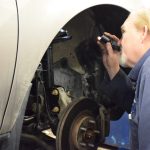A look at some potentially slimy dealer tactics reported by new car shoppers
Does one need to spend hundreds of dollars on add-on treatments or products to maintain their new car paint finish and corrosion warranty in good standing? The answer is no—but numerous shoppers we’ve heard from lately say that their dealer dealer may be trying to convince them otherwise.
The question is common: “do I / should I to buy this pricey add-on treatment? The dealer says I need it for my paint and corrosion warranty.”
Sometimes, sales reps offer added-cost treatments casually, and many readers have asked if they should purchase a pricey package that includes special paint protection or rust-proofing treatments, enabling extended warranty coverage on seat upholstery, paint, interior trim, and against rust, and the like.
Key word? Extended.
If you feel the extra coverage is worth the cost after reading the fine-print, these added-cost treatments may be worthy of your consideration. But the more concerning thing, and the focus of this story, is shoppers being told that opting out of these extra-cost treatments will void or otherwise compromise their factory paint, finish or corrosion warranty coverage. This is false, and amounts to a profit-driving, dealer-level predatory sales tactic designed to strike shoppers while their wallets are open.
One reader explained about a salesperson who advised her she’d have to sign a special disclaimer to opt out of a pricey add-on paint protection treatment, and a $600 rust module, an electronic device that promises to prevent rust.
“They said that they wouldn’t be responsible for bubbles, cracks, rust or paint damage if I didn’t buy these items” the reader said. “The salesperson acted astonished when I said I didn’t want this stuff, but it wasn’t in my budget. He said he’d have to get me to sign a disclaimer, indicating that I wouldn’t be covered for any rust or paint defects.”
A representative at Honda Canada commented “Customers are not required to purchase extra products to enable their warranty. If customers have any questions about Honda products, offers, or warrantees, we encourage them to contact our customer service team for assistance”.
An official at Fiat Chrysler Automobiles (FCA) says that no extra products or services are required to maintain their new vehicle corrosion or finish warranty. “We use corrosion-resistant metals that are galvanized and phosphate dipped, and we add an electrically bonded topcoat, then clear coat. This offers excellent corrosion protection.”
The FCA official also notes that installation of non-factory rust-proofing provisions may be a bad idea. “Drilling holes for the application of add-on rust-proofing can expose some of our metal, and negates the corrosion protection we provide from the factory.”
The aftersales team at Kia Canada piped in as well. “Our warranty covers paint defects for 36-months/60,000 km, and perforations due to rust are covered for 60-months/unlimited km. Customers don’t need to apply or buy into additional products at the point of purchase to secure coverage. Our manufacturing facilities apply protectant treatments to strategic areas of our vehicles for durability. Moreover, the zinc coated galvanized steel used in today’s vehicles are another important step in preventing rust.”
Kia says that they don’t endorse the use of non-Kia approved rust-prevention accessories, but that in most cases, these wouldn’t affect the warranty.
Interestingly, Kia officials also mention that oil-spray rustproofing, and electronic rust modules are not supported in their HEV, PHEV and EV models. “Oil spray rustproofing procedures have chemicals that can cause premature deterioration of insulating properties of Hybrid/EV components such as wiring harnesses, connectors and electrical components. Electronic rustproofing modules, further, can induce an electrostatic charge in the vehicle body, which may affect the grounding of various electrical components”.
As such, use of non-factory rust protection measures in an electric or hybrid Kia may actually cause issues, and void its warranty.
“So, we don’t endorse aftermarket rustproofing procedures on any of our vehicles, and strongly dissuade their use for HEV, PHEV and EV vehicles”.
Mercedes Benz Canada says that add-ons are neither necessary nor recommended to maintain the vehicle’s paint warranty, adding that “the expectation is that the paint finish will be maintained by cleaning the car regularly using approved products. Inspection of the paint/body is included within the scope of the factory maintenance schedule, when customers service their vehicles at authorized dealers.”
On the topic of electronic rust modules, Mercedes Canada says that they don’t test or offer such devices. They add that “drilling into body panels for the application of rust proofing can contribute to corrosion, if precautions are not taken to protect exposed edges from the drilling process. If this were to occur, the manufacturer warranty would not apply.”
The list goes on, but the point is simple: ask any automaker whether an extra-cost add-on is required to activate the paint or rust warranty, and the answer is a resounding ‘no’—but that’s not always reflected at the dealer level.
A few other notes.
One customer got in touch with a story about a sales rep that attempted to sell her extended paint, interior and corrosion protection coverage—but couldn’t come up with a price.
“They priced this out based on how many miles I’d put on the truck” she said. “I asked for a flat out price, and there wasn’t one. It depended on how many years and miles I’d put on. I considered it, and they’d be adding it to my monthly payments. That’s how it was priced. But when I did the math, it was thousands of dollars– so I opted out. The sales rep then told me that my new truck’s paint and finish warranty may be voided, so I called B.S., and walked out the door”.
This approach is the correct one—though the reader said the dealer sales manager contacted her, included the coverage for free, and offered up a discount on the vehicle, to regain her business.
If something sounds fishy, go above the dealer level. Track down warranty information booklets online, or contact the carmaker’s offices and speak to someone in customer relations about your concerns.
Finally, remember to exercise caution when considering electronic rust modules, which are commonly sold for hundreds of dollars with the promise of fending off rust. Research their effectiveness before agreeing to buy one.
Though the scientific principle behind an electronic rust module is relatively sound, they don’t often work as promised, according to Jeff Major—an autobody collision tech with an interesting hobby. When Major repairs a vehicle body, he checks to see if the vehicle in question has a rust module, and then checks the vehicle up close and personal, under its skin, for rust, as he repairs it.
His conclusion?
“I’ve yet to see a module-equipped vehicle that wasn’t rusting. We even had a few-month old car in the other day, equipped with a module, but it was beginning to show normal surface rust on some parts of the underside. This customer told me that they paid $650 for the module, and was not impressed when I showed her the rust beginning to form, even before the vehicle’s first oil change. I wouldn’t pay a dime for one of these things”.
Better options may exist for rust-proofing your ride, and many are highly advisable in most Canadian climates. Just be aware of the cost.
One reader recently reported that a dealer-installed spray-on rust treatment was offered for his new vehicle, at a cost of nearly $800. He asked if it was worth the money. My suggestion? Check out a reputable non-dealer franchise, like Krown Rust Control.
“At Krown we charge $120 for any car and slightly more ($130 and $140) for larger vehicles such as minivans, SUVS and trucks” says Krown Rust Control president, Freeman Young.
He adds “dealerships charge much more because of their higher overheads and need for greater profits. In many cases, the dealership is making more than 95% profit on those packages—and since the cost is often added into the monthly car payment, it’s not always realized by the purchaser”.
Young notes that some auto manufacturers even use Krown’s corrosion resisting formula at the factory where the vehicles are built.
Ultimately, the main difference between an $800 dealer oil-spray and a $140 treatment by a franchise like Krown, is about $660.








